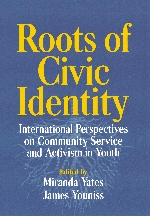Book contents
- Frontmatter
- Contents
- Preface
- List of Contributors
- Introduction: International Perspectives on the Roots of Civic Identity
- 1 Community Service and Political-Moral Discussions among Adolescents: A Study of a Mandatory School-Based Program in the United States
- 2 Social and Family Determinants of Community Service Involvement in Canadian Youth
- 3 Exploring Adolescent Altruism: British Young People's Involvement in Voluntary Work and Campaigning
- 4 Youth, Solidarity, and Civic Commitment in Italy: An Analysis of the Personal and Social Characteristics of Volunteers and Their Organizations
- 5 Political Socialization in the New States of Germany
- 6 Community Service and Social Cognitive Development in German Adolescents
- 7 Adolescents and the “Social Contract”: Developmental Roots of Citizenship in Seven Countries
- 8 Political Socialization in a Divided Society: The Case of Northern Ireland
- 9 Youth Experience in the Palestinian Intifada: A Case Study in Intensity, Complexity, Paradox, and Competence
- 10 Beyond the Call of Duty: The Service of Israeli Youth in Military and Civic Contexts
- 11 Recent Trends in Civic Engagement among Japanese Youth
- 12 Learning Politics in the Crucible: The Socialization of Taiwan High School Students as Citizens in a New Democracy
- Conclusion: Transcending Themes
- Author Index
- Subject Index
5 - Political Socialization in the New States of Germany
Published online by Cambridge University Press: 04 August 2010
- Frontmatter
- Contents
- Preface
- List of Contributors
- Introduction: International Perspectives on the Roots of Civic Identity
- 1 Community Service and Political-Moral Discussions among Adolescents: A Study of a Mandatory School-Based Program in the United States
- 2 Social and Family Determinants of Community Service Involvement in Canadian Youth
- 3 Exploring Adolescent Altruism: British Young People's Involvement in Voluntary Work and Campaigning
- 4 Youth, Solidarity, and Civic Commitment in Italy: An Analysis of the Personal and Social Characteristics of Volunteers and Their Organizations
- 5 Political Socialization in the New States of Germany
- 6 Community Service and Social Cognitive Development in German Adolescents
- 7 Adolescents and the “Social Contract”: Developmental Roots of Citizenship in Seven Countries
- 8 Political Socialization in a Divided Society: The Case of Northern Ireland
- 9 Youth Experience in the Palestinian Intifada: A Case Study in Intensity, Complexity, Paradox, and Competence
- 10 Beyond the Call of Duty: The Service of Israeli Youth in Military and Civic Contexts
- 11 Recent Trends in Civic Engagement among Japanese Youth
- 12 Learning Politics in the Crucible: The Socialization of Taiwan High School Students as Citizens in a New Democracy
- Conclusion: Transcending Themes
- Author Index
- Subject Index
Summary
The study of political socialization in the former Communist part of Germany, the Eastern “new states,” is of great practical and theoretical interest. It is of practical interest because it directly bears on questions regarding the future development of democracy in unified Germany. Will it be possible to integrate the younger generations in the East into the liberal and democratic tradition of the Federal Republic of Germany (FRG)? Will these youth be able to adapt to the institutional rules of democracy? The study of political socialization in the new states of Germany is of theoretical interest because it allows the investigation of the influence of contextual conditions in an extraordinary historical situation. This situation in Germany presents the opportunity to examine which contextual conditions adolescents identify with democratic procedures and which conditions encourage a drift toward antidemocratic attitudes and behaviors including right-wing or left-wing party identifications. The breakdown of the political system of the German Democratic Republic (GDR) in 1989 (Wende) and the subsequent entry into the FRG in 1990 (Beitritt) were accompanied and followed by rapid social changes in the economy, the labor market, and societal institutions. All these changes influenced everyday life, including consumer habits, mobility, and politically relevant attitudes and behaviors. Adolescents may react differently to these events, depending on family traditions and experiences, on school and work experiences, and on interactions in peer groups and friendships as well as in neighborhoods and communities. The study of such influences should enlarge our empirical and theoretical knowledge of socialization and development in general.
- Type
- Chapter
- Information
- Roots of Civic IdentityInternational Perspectives on Community Service and Activism in Youth, pp. 97 - 113Publisher: Cambridge University PressPrint publication year: 1998



